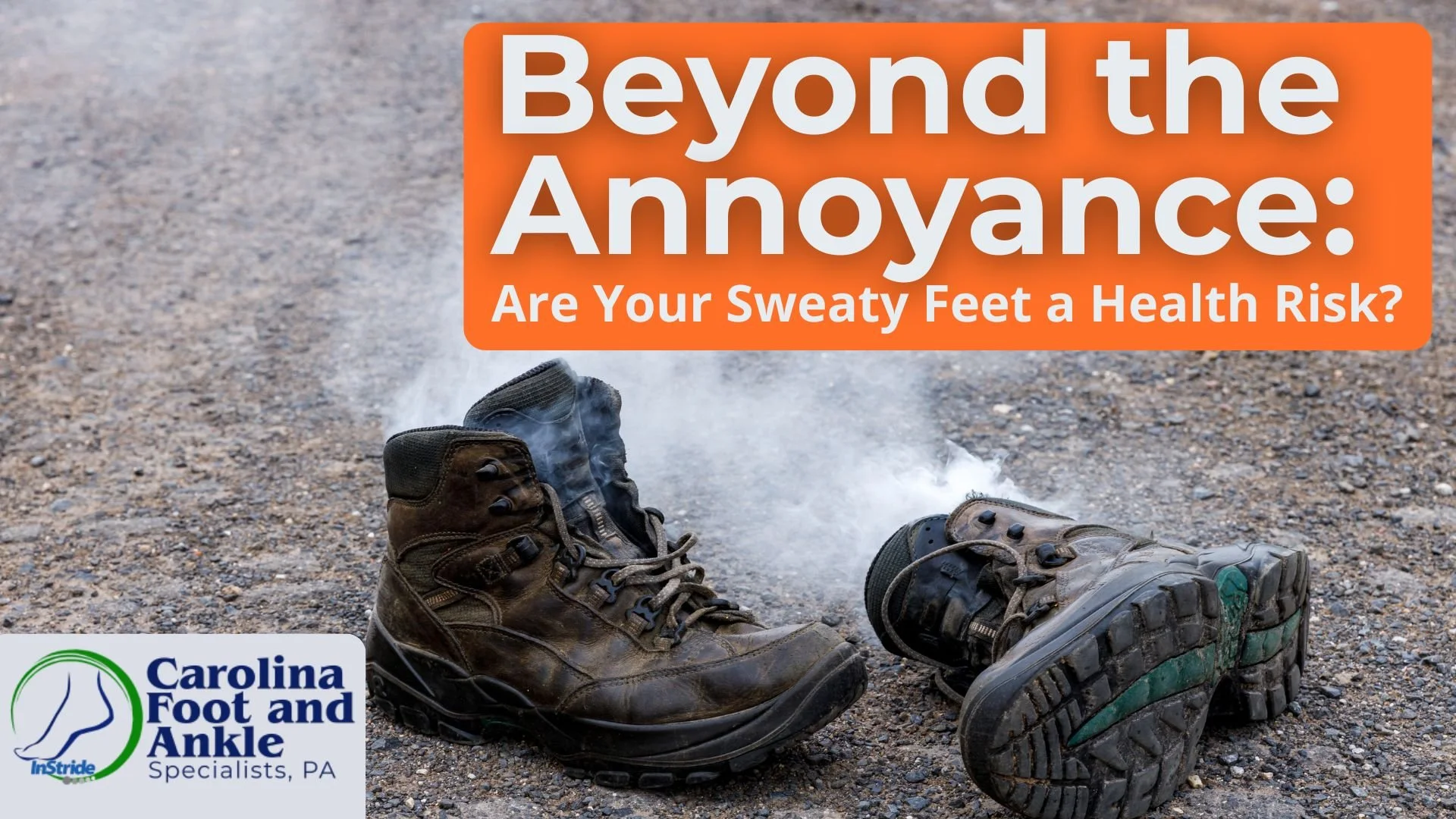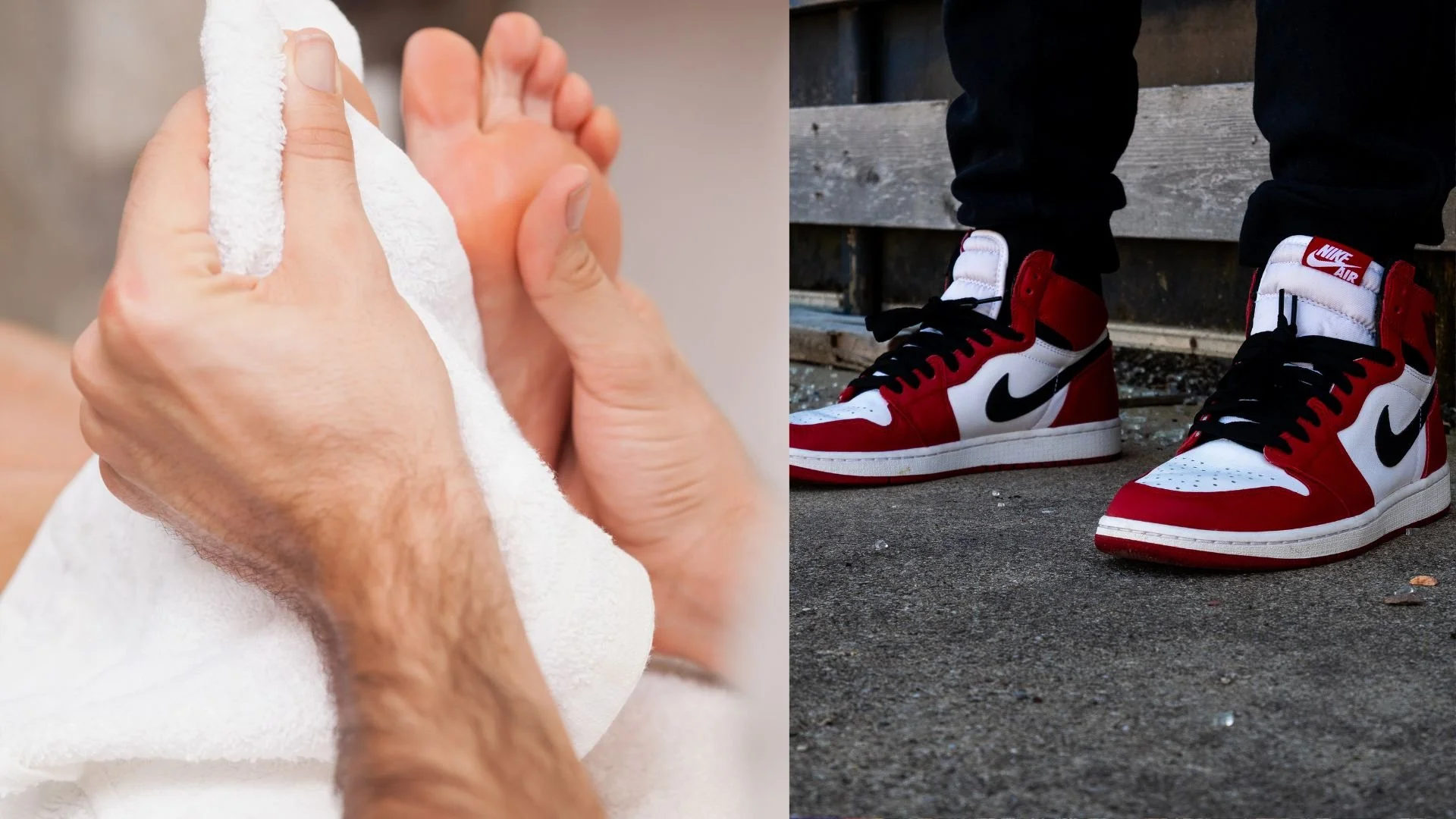Beyond the Annoyance: Are Your Sweaty Feet a Health Risk?
Sweaty feet can be uncomfortable, but can they might also pose a danger to your health.
We’ve all experienced it, especially during a sweltering summer day in the Carolinas: that damp, uncomfortable feeling of sweaty feet.
For most, it’s a minor annoyance, easily remedied by kicking off our shoes. But for some, it’s a constant, year-round battle that soaks through socks and ruins shoes. This raises an important question: is having excessively sweaty feet just an inconvenience, or can it be a serious health issue?
The Truth About Sweaty Feet
At Carolina Foot and Ankle Specialists, this is a topic that comes up more often than you might think. While sweaty feet themselves aren't typically "dangerous" in a life-threatening way, they can be a significant gateway to a host of other serious foot health problems. Excessive sweat is a welcome mat for trouble.
It creates the exact environment where bacteria and fungus decide to move in and cause real, lasting damage. Ignoring it is like ignoring a slow leak under your sink; eventually, you’re going to have a much bigger problem.
The Medical Term for a Common Problem: Hyperhidrosis
Occasional sweaty feet due to heat or exercise is normal. But, when the sweating is excessive and occurs without the usual triggers, it’s a medical condition called hyperhidrosis. Your feet have more sweat glands per inch than any other part of your body, and in people with hyperhidrosis, these glands are overactive, producing far more sweat than is needed to regulate body temperature.
While overactive sweat glands can be annoying and even embarrassing, sweaty feet alone typically don’t lead to any serious threat to your overall health.
Damp socks can turn into fungal infections, possibly leading to further complications.
The Real Dangers of Damp Feet
So, if sweaty feet aren’t dangerous, how does a little extra moisture lead to serious issues? The constant dampness compromises your skin's natural protective barrier, leading to several complications.
Fungal Infections (Athlete's Foot and Toenail Fungus)
This is the most common complication. Fungi thrive in dark, warm, and moist environments, and these are the exact conditions inside the shoe of someone with hyperhidrosis. Our doctors recently treated a young professional from the Gastonia area who worked long hours in dress shoes and suffered from extremely sweaty feet. He had a persistent, itchy rash between his toes that over-the-counter creams just couldn't beat. This was a classic case of severe athlete's foot, fueled by the constant moisture. The fungus had a perfect, unchanging environment to flourish.
Bacterial Infections
Just like fungus, bacteria also love moisture. The breakdown of sweat by bacteria is what causes foot odor, but it can get worse. Bacteria can lead to pitted keratolysis (which creates crater-like pits in the soles of the feet) or, more seriously, infect any small cut or blister, potentially leading to cellulitis, a serious skin infection.
Blisters and Skin Breakdown
Constantly wet skin is soft, weak, and incredibly fragile. The friction from a sock or shoe that would normally be harmless can easily cause painful blisters and chafing on perpetually damp skin. For athletes or those who work on their feet all day, this can be debilitating, and for diabetics, it can lead to missed infections. We recently helped a factory worker from the Gastonia area who was on his feet for 10-hour shifts. His hyperhidrosis was so severe that his socks were soaked by mid-morning. He came to our office with painful blisters and raw skin that just wouldn't heal. His sweaty feet were very uncomfortable and were making it difficult for him to do his job.
Social and Psychological Impact
We cannot discount the very real impact on quality of life. The fear of foot odor, the embarrassment of leaving damp footprints, or the need to change socks multiple times a day can cause significant anxiety and social withdrawal.
Keeping your feet dry and wearing the right footwear can help to alleviate sweaty feet.
What Can You Do About Sweaty Feet?
The good news is that you don't have to live with the consequences of hyperhidrosis. Effective management is possible, and it often starts with simple, consistent habits.
Our Recommendations for Managing Sweaty Feet:
Choose the Right Socks: Opt for moisture-wicking materials like merino wool, nylon, or polyester. Avoid 100% cotton, which holds onto moisture like a sponge. Changing your socks once or even twice during the day can make a huge difference.
Rotate Your Shoes: Never wear the same pair of shoes two days in a row. Give them a full 24 hours to dry out completely. Choosing shoes made of breathable materials can also help.
Use Antiperspirants: The same antiperspirant you use for your underarms can be effective on your feet. Apply it to clean, dry feet before bed. There are also specialized clinical-strength antiperspirants specifically for feet.
Try Foot Powders: Medicated or absorbent foot powders can help absorb moisture and reduce friction.
When to Seek Professional Help From a Podiatrist
If these at-home measures aren't enough, it's time to consult a professional. This is especially true if you notice signs of a secondary infection, like persistent itching, redness, blisters, or a foul odor that doesn't go away.
Our team at Carolina Foot and Ankle Specialists has experience treating hyperhidrosis. We can help you find a solution that works for you, from prescription-strength antiperspirants and topical antibiotics to oral medications. You can get the relief you need without having to suffer in silence.
So, are sweaty feet dangerous? While the sweat itself is harmless, the conditions it creates can be. If your sweaty feet are impacting your comfort, confidence, or leading to other skin issues, it's a legitimate health concern that deserves professional attention.
Don't let sweaty feet dictate your life. If you're struggling with the consequences of hyperhidrosis, schedule an appointment at our Gastonia office today and take the first step toward dry, healthy feet.




